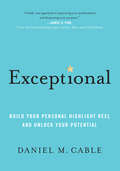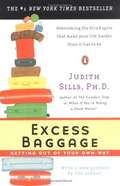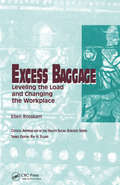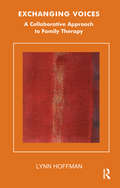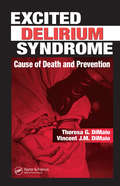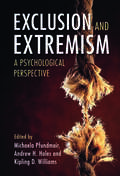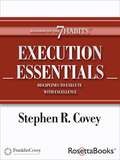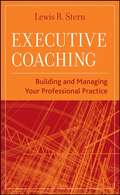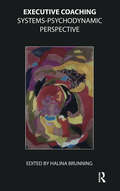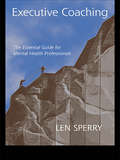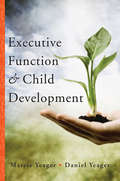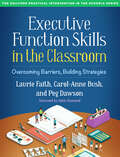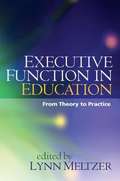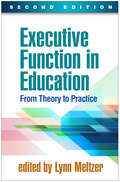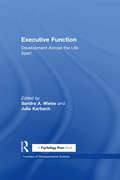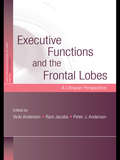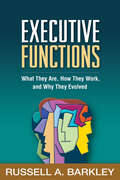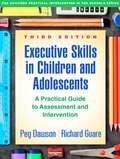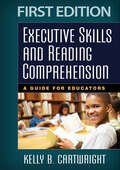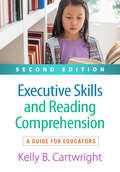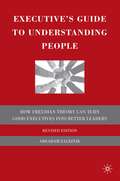- Table View
- List View
Exceptional: Build Your Personal Highlight Reel and Unlock Your Potential
by Daniel M. Cable"A bold new approach to improving your performance and deepening your purpose." —DANIEL H. PINK, #1 New York Times bestselling author of Drive, When, and To Sell Is HumanA Three-Step Process to Access and Activate Your Full PotentialImagine switching on the television to see a highlight reel of the best moments from your life. Like a professional athlete, with every clip you'd learn how to repeat past successes, pinpoint positive blind spots, and build confidence in your skills.In Exceptional, London Business School professor and expert social scientist Daniel M. Cable reveals how building your own personal highlight reel—a collection of positive memories about yourself from your network—is key to accessing your potential. Using the latest science and proven research behind best-self activation, his three-step process will help you improve your life by:• Focusing on what you do best• Crafting a life around your strengths• Increasing your confidence and resilienceCable has worked with tens of thousands of people to create their highlight reels and make the most of their gifts. The three-step process ultimately reveals how living up to your full potential can improve the relationships you value most and transform your mindset to one of possibility.Each of us can bring forth a version of ourself that is uniquely outstanding. It's a version of ourself that already exists—all we have to do is access it.• A practical book on how to create one's own human highlight reel, and then use that highlight reel to direct one to success, growth, happiness, and fulfillment in work and life based on scientific results• Great for readers interested in achieving self-improvement and a sense of purpose.• You'll love this book if you love books like Mindset: The New Psychology of Success by Carol S. Dweck, Presence: Bringing Your Boldest Self to Your Biggest Challenges by Amy Cuddy, and The Power of Habit: Why We Do What We Do in Life and Business by Charles Duhigg.Digital audio edition read by the author.
Excess Baggage: Getting Out of Your Own Way
by Judith SillsEach of us has a little too much of our own good thing--it's excess baggage that's holding us back. Using easy-to-follow but powerful psychological exercises, Dr. Sills helps you discover just what it is about yourself that keeps you from getting what you want. Then you can set your excess baggage down forever--and get out of your own way.
Excess Baggage: Leveling the Load and Changing the Workplace (Critical Approaches in the Health Social Sciences Series)
by Ellen Rosskam Ray H EllingBased on groundbreaking research on the working conditions of airport check-in workers in two countries, a previously unstudied category of predominantly women workers, Ellen Rosskam describes a form of work characterized as modern-day Taylorism. An occupation greatly affected by new forms of work organization and management practices-caught in the throes of rapid change due to international competition, alliances, mergers, and the application of cost-efficiency strategies-check-in work has been undermined in recent years by the adverse effects of liberalization and technological change.By peeling away the veneer of glamour associated with airport check-in work, Rosskam reveals how changes in work organization in this sector have de-skilled, disempowered, and ultimately demoralized workers. In "Excess Baggage", weaving through the psychological distress, physical pain from musculoskeletal disorders, strain, and violence that check-in workers experience and describe in their own words, a picture emerges of a job perceived to be "safe," "clean," "glamour girl" work, but which is comparable to industrial workplaces that require heavy manual lifting, obligingly performed in skirts, dresses, and pretty little shoes.
Excessive Subjectivity: Kant, Hegel, Lacan, and the Foundations of Ethics (Insurrections: Critical Studies in Religion, Politics, and Culture)
by Dominik FinkeldeHow are we to conceive of acts that suddenly expose the injustice of the prevailing order? These acts challenge long-standing hidden or silently tolerated injustices, but as they are unsupported by existing ethical rules they pose a drastic challenge to dominant norms. In Excessive Subjectivity, Dominik Finkelde rereads the tradition of German idealism and finds in it the potential for transformative acts that are capable of revolutionizing the social order.Finkelde's discussion of the meaning and structure of the ethical act meticulously engages thinkers typically treated as opposed—Kant, Hegel, and Lacan—to develop the concept of excessive subjectivity, which is characterized by nonconformist acts that reshape the contours of ethical life. For Kant, the subject is defined by the ethical acts she performs. Hegel interprets Kant's categorical imperative as the ability of an individual's conscience to exceed the existing state of affairs. Lacan emphasizes the transgressive force of unconscious desire on the ethical agent. Through these thinkers Finkelde develops a radical ethics for contemporary times. Integrating perspectives from both analytical and continental philosophy, Excessive Subjectivity is a distinctive contribution to our understanding of the ethical subject.
Exchanging Voices: A Collaborative Approach to Family Therapy (The Systemic Thinking and Practice Series)
by Lynn HoffmanFor this book, the author has not only compiled her writing for the last ten years, but she has written her own commentary about the personal and intellectual journey which led her from one paper to the next. The papers themselves read like a chronicle of the major ideas of the past ten years, but her commentary sheds a new light on the process of learning. It enables the reader to understand the way one woman has listened to the voices of a changing environment, and listened to the changes in herself in order to expand her thinking and her practice as a therapist.
Excited Delirium Syndrome: Cause of Death and Prevention
by Theresa G. DiMaio Vincent J.M. DiMaio M.D.During a routine investigation, a suspect turns hostile. The officers on the scene spring into action and get the suspect� under control by handcuffing him. Though the suspect has been successfully subdued � he dies shortly thereafter� A psychiatric patient suddenly becomes violent. The hospital staff struggles to control the patient
Excited Delirium Syndrome: Cause of Death and Prevention
by Theresa G. DiMaio Vincent J.M. DiMaio M.D.During a routine investigation, a suspect turns hostile. The officers on the scene spring into action and get the suspect� under control by handcuffing him. Though the suspect has been successfully subdued � he dies shortly thereafter� A psychiatric patient suddenly becomes violent. The hospital staff struggles to control the patient
Excluded From School: Systemic Practice for Mental Health and Education Professionals
by Morag Stuart Sue RendallExcluded From School exposes the reasons why, despite many national and local initiatives, large numbers of children continue to tax the education system to such a degree that they become permanently excluded from school. Sue Rendall and Morag Stuart draw on their experience in psychology and education to demonstrate the need for a more thorough exploration of the underlying root causes of the problem. Based on a systemic framework, their approach allows the inclusion of a vast range of possible contributory factors: within the child, within the family, within the school, and within the complex interrelations between these three systems. By demonstrating the need for inter-discipline and inter-agency collaboration, the authors succeed in presenting a persuasive challenge to the blame culture which exists between schools, parents and educational professionals and policymakers in relation to school exclusion. The original research presented here, along with the inclusion of the experiences of children, parents and teachers, provides a valuable new perspective on the problem of school exclusions that will be welcomed by all professionals working in this field.
Exclusion and Extremism: A Psychological Perspective
by Kipling D. Williams Michaela Pfundmair Andrew H. HalesThe question of how people develop extreme, radical or even terrorist ideas and behaviors is one which is attracting more and more scientific attention. There are many factors that contribute to such extremist attitudes. This book focuses on one specific contributor which has received only little attention in the past: social exclusion. Recent research shows that being kept apart from others, physically or emotionally, is a powerful event in people's lives. The chapters provide an overview of the existing body of research for the first time and explore the exclusion-extremism link in depth by gathering together a seminal collection of essays, written by leading social psychologists. Timely, novel, and highly instructive, this volume delivers an expert understanding of psychological underpinnings of such behavior and offer inspiration for future research.
Execution Essentials
by Stephen CoveyWhy do most corporate initiatives fall short of their goals--despite good planning and strong leadership? According to Dr. Stephen R. Covey, bestselling author of The 7 Habits of Highly Effective People, the difference between success and failure is all in the execution. As leader of the corporate consulting firm FranklinCovey, Dr. Stephen R. Covey has observed what works in terms of execution--both from the boardroom and on the front lines. Here, he condenses his expertise on effective execution gathered from interviews with members of over 1,000 teams, data from more than 200,000 surveys, and consultation with over 400 organizations of all sizes. With easy-to-follow strategies and a workbook allowing readers to quickly apply new expertise, this guide provides a clear pathway to success in helping your organization achieve its goals. ABOUT THE AUTHOR Dr. Stephen R. Covey (1932-2012) was a leading authority on leadership and family relations. He held a Bachelor of Science from the University of Utah, an MBA from Harvard, and a PhD from Brigham Young University. Dr. Covey was Vice Chairman of FranklinCovey Co., and in high demand as a speaker, teacher, and organizational consultant. Throughout his career, Dr. Covey brought new insight and understanding to millions of readers and students. ABOUT THE SERIES The Essentials series offers the best of Dr. Stephen R. Covey's wisdom and expertise, gained throughout a decades-long career guiding corporations and leaders on management, execution, and leadership. Each Essentials book is tailored specifically toward an aspect of corporate leadership that offers unique challenges to organizations and individuals alike--offering concrete step-by-step advice toward improvement-and extensive workbooks designed to help you put new ideas into practice.
Executive Coaching
by Lewis R. SternUnderstand all the aspects of becoming an executive coach, from acquiring training to marketing your practice, with Executive Coaching: Building and Managing Your Professional Practice. Hands-on information on topics like acquiring the right training and making the transition from other fields is written in an accessible manner by a successful and experienced coach. Whether you're a novice or an established coach looking to expand your practice, you will benefit from the step-by-step plan for setting up and operating a lucrative executive coaching practice.
Executive Coaching: Systems-Psychodynamic Perspective
by Halina BrunningExecutive Coaching focuses on the coaching applications of systemic-psychodynamic theory in the context of organizational life that is both goal-orientated and held in a managerial/leadership context.
Executive Coaching: The Essential Guide for Mental Health Professionals
by Len SperryFor many mental health professionals, executive and personal coaching represent attractive alternatives to managed care practice. This book provides mental health professionals with a map of the territory of the corporate world and describes in detail the major theoretical coaching models and progressive phases. Sperry addresses both executive coaching and personal coaching, revealing the practical, ethical and legal aspects of beginning and maintaining an active coaching practice.
Executive Function & Child Development
by Marcie Yeager Daniel YeagerA brain-based approach to helping kids stay focused and achieve. Poor executive function (EF) in the brain can mean behavioral and attentional problems in school. This book explains to professionals and parents how EF develops in kids, what EF difficulties look like, and what creative and effective interventions can meet their needs. Executive functions involve mental processes such as: Working memory-holding several pieces of information in mind while we try to do something with them-for example, understand and solve a problem or carry out a task. Response inhibition-inhibiting actions that interfere with our intentions or goals. Shifting focus-interrupting an ongoing response in order to direct attention to other aspects of a situation that are important for goal attainment. Cognitive flexibility-generating alternative methods of solving a problem or reaching a goal. Self-monitoring-checking on one's own cognitions and actions to assure that they are in line with one's intentions. Goal Orientation-creating and carrying out a multi-step plan for achieving a goal in a timely fashion, keeping the "big picture" in mind.
Executive Function Skills in the Classroom: Overcoming Barriers, Building Strategies (The Guilford Practical Intervention in the Schools Series)
by Peg Dawson Laurie Faith Carol-Anne BushWith insight and humor, this motivating guide shows how to bring executive functions (EF) to the forefront in K–8 classrooms--without adopting a new curriculum or scripted program. Ideal for professional development, the book includes flexible, practical, research-based ideas for implementation in a variety of classroom contexts. It shares stories from dozens of expert teachers who are integrating explicit EF support across the school day. Provided is a clear approach for talking about EF barriers and strategies as part of instruction, and working as a class to problem-solve, explore, and apply the strategies that feel right for each student. Purchasers get access to a Web page where they can download and print several reproducible tools in a convenient 8 1/2" x 11" size. This book is in The Guilford Practical Intervention in the Schools Series, edited by Sandra M. Chafouleas.
Executive Function and Dysfunction
by Scott J. Hunter Elizabeth P. SparrowExecutive dysfunction occurs in many clinical conditions and has significant impact on multiple facets of life. This book summarizes executive function and dysfunction for practitioners, researchers and educators, covering lifespan development, assessment, impact and interventions. Drawing together clinical, neurobiological and developmental viewpoints, the authors summarize the latest research findings in practical and applied terms, and review conceptual approaches to assessing and identifying executive function and dysfunction. Several chapters are devoted to practical aspects of executive dysfunction, including research-based treatment strategies, educational implications, forensic cautions and intervention resources. Executive dysfunction in ADHD, LD, MR, autism, mood disorders, epilepsy, cancer and TBI is covered, with test performance, neuroimaging and clinical presentation for these clinical conditions. The book concludes with anticipation of future work in the field. This is a key reference for medical, psychological and educational professionals who work with children, adolescents and young adults in clinical and educational settings.
Executive Function in Education
by Lynn MeltzerThis uniquely integrative book brings together research on executive function processes from leaders in education, neuroscience, and psychology. It focuses on how to apply current knowledge to assessment and instruction with diverse learners, including typically developing children and those with learning difficulties and developmental disabilities. The role of executive function processes in learning is examined and methods for identifying executive function difficulties are reviewed. Chapters describe scientifically grounded models for promoting these key cognitive capacities at the level of the individual child, the classroom, and the entire school. Implications for teaching particular content areas reading, writing, and math are also discussed.
Executive Function in Education, Second Edition: From Theory to Practice
by Lynn MeltzerThis groundbreaking volume, now revised and updated, has given thousands of educators and clinicians a deeper understanding of executive function (EF) processes in typically developing children and those with learning difficulties and developmental disabilities. The book elucidates how PreK–12 students develop such key capacities as goal setting, organization, cognitive flexibility, working memory, and self-monitoring. Leading experts in education, neuroscience, and psychology explore the links between EF and academic performance and present practical applications for assessment and instruction. Exemplary practices for supporting students with EF difficulties in particular content areas--reading, writing, and math--are reviewed. New to This Edition *Expanded coverage of reading--chapters on recent fMRI research findings; working memory and reading; and self-regulation and reading comprehension. *Chapter on early childhood. *Chapter on embedding EF strategies in the curriculum *Updated throughout with a decade's worth of significant advances in research, theory, and educational best practices. See also Meltzer's authored book Promoting Executive Function in the Classroom, which provides easy-to-implement assessment tools, teaching techniques and activities, and planning aids.
Executive Function: Development Across the Life Span (Frontiers of Developmental Science)
by Julia Karbach Sandra A. WiebeExecutive Function: Development Across the Life Span presents perspectives from leading researchers and theorists on the development of executive function from infancy to late adulthood and the factors that shape its growth and decline. Executive function is the set of higher-order cognitive processes involved in regulating attention, thoughts, and actions. Relative to other cognitive domains, its development is slow and decline begins early in late adulthood. As such, it is particularly sensitive to variations in environments and experiences, and there is growing evidence that it is susceptible to intervention – important because of its link to a wide range of important life outcomes. The volume is made up of four sections. It begins with an overview of executive function’s typical development across the lifespan, providing a foundation for the remainder of the volume. The second section presents insights into mechanisms of executive function, as provided by a variety of methodological approaches. The third and fourth sections review the current research evidence on specific factors that shape executive function’s development, focusing on normative (e.g., bilingualism, physical activity, cognitive training) and clinically relevant (e.g., substance use, neurodegenerative disease) developmental pathways.
Executive Functions and the Frontal Lobes: A Lifespan Perspective (Studies on Neuropsychology, Neurology and Cognition)
by Vicki AndersonThis volume has as its primary aim the examination of issues concerning executive function and frontal lobe development. While many texts have addressed these issues, this is the first to do so within a specifically developmental framework. This area of cognitive function has received increasing attention over the past decade, and it is now established that the frontal lobes, and associated executive functions, are critical for efficient functioning in daily life. It is also clear, and of particular relevance to this text, that these functions develop gradually through childhood, and then deteriorate during old age. These developmental trajectories, and the impact of any interruption to them, are the focus of this volume.
Executive Functions: What They Are, How They Work, and Why They Evolved
by Russell A. BarkleyThis groundbreaking book offers a comprehensive theory of executive functioning (EF) with important clinical implications. Synthesizing cutting-edge neuropsychological and evolutionary research, Russell A. Barkley presents a model of EF that is rooted in meaningful activities of daily life. He describes how abilities such as emotion regulation, self-motivation, planning, and working memory enable people to pursue both personal and collective goals that are critical to survival. Key stages of EF development are identified and the far-reaching individual and social costs of EF deficits detailed. Barkley explains specific ways that his model may support much-needed advances in assessment and treatment.
Executive Skills In Children And Adolescents: A Practical Guide To Assessment And Intervention
by Peg Dawson Richard GuareMore than 100,000 school practitioners and teachers (K–12) have benefited from the step-by-step guidelines and practical tools in this influential go-to resource, now revised and expanded with six new chapters. The third edition presents effective ways to assess students' strengths and weaknesses, create supportive instructional environments, and promote specific skills, such as organization, time management, sustained attention, and emotional control. Strategies for individualized and classwide intervention are illustrated with vivid examples and sample scripts. In a large-size format with lay-flat binding for easy photocopying, the book includes 38 reproducible forms and handouts.
Executive Skills and Reading Comprehension
by Nell K. Duke Kelly B. CartwrightHow do K-12 students become self-regulated learners who actively deploy comprehension strategies to make meaning from texts? This cutting-edge guide is the first book to highlight the importance of executive skills for improving reading comprehension. Chapters review the research base for particular executive functions--such as planning, organization, cognitive flexibility, and impulse control--and present practical skills-building strategies for the classroom. Detailed examples show what each skill looks like in real readers, and sidebars draw explicit connections to the Common Core State Standards (CCSS). Reproducible planning and assessment forms can be downloaded and printed in a convenient 8 1/2" x 11" size.
Executive Skills and Reading Comprehension: A Guide for Educators
by Kelly B. CartwrightThis pioneering book is now in a revised and expanded second edition featuring the latest neuroscientific knowledge and instructional strategies. Kelly B. Cartwright provides a teacher-friendly explanation of executive skills--such as planning, organization, cognitive flexibility, and impulse control--and their role in reading comprehension. Detailed examples illustrate how each skill is deployed by strong comprehenders and ways to tailor instruction for students who are struggling. The companion website features reproducible planning and assessment forms from the book as well as supplemental card sorts to teach and assess cognitive flexibility, all ready to download and print in a convenient 8 1/2" x 11" size. New to This Edition *Updated throughout with advances in theory, research, and instruction. *Chapter on word recognition, with particular attention to dyslexia. *Information on the development of the brain's reading network. *Expanded emphasis on oral language comprehension. *Appendix of intervention studies; online-only supplement with card sorts to teach and assess cognitive flexibility.
Executive’s Guide to Understanding People
by Abraham ZaleznikZaleznik takes managers into Freud's world of psychoanalysis and shows managers what they need to know about themselves and their employees to better motivate and lead. He discusses a variety of things relevant to today's top leaders including Freud's origin of psychoanalysis, the unconscious, neuroses, organizations and change.
